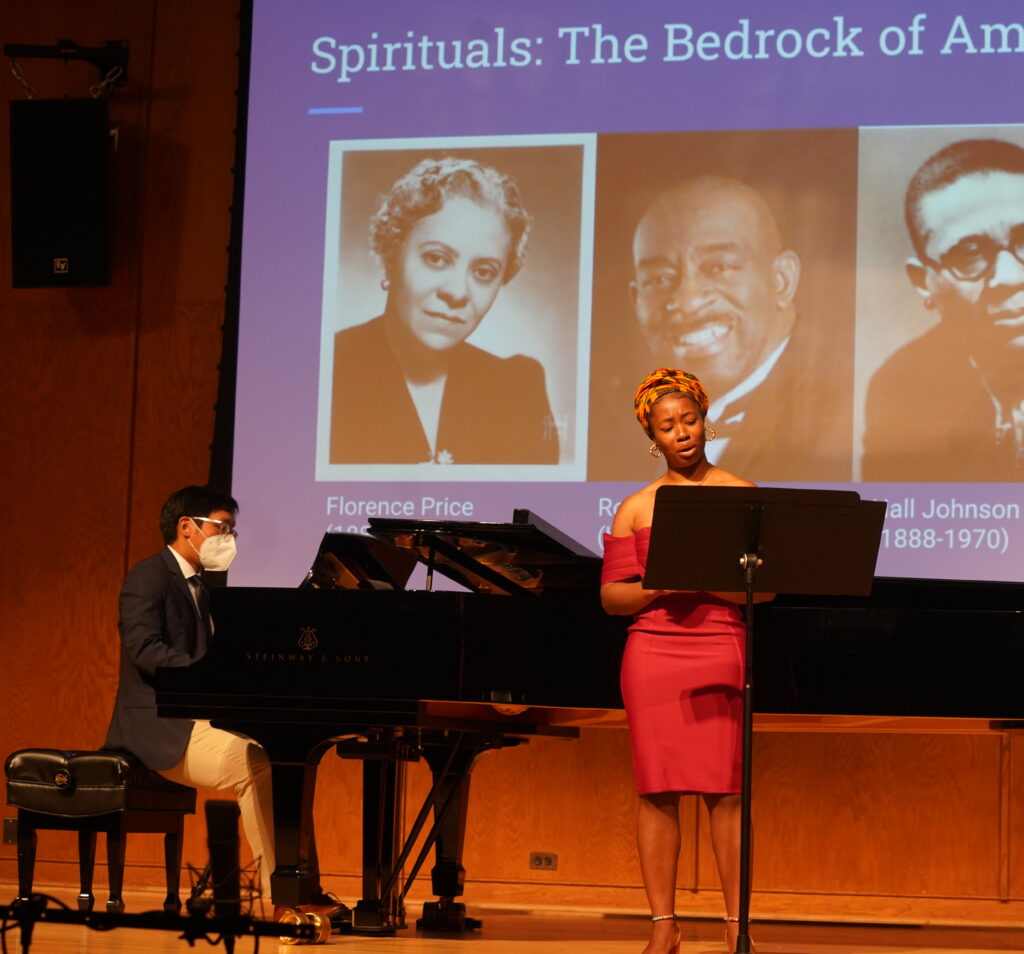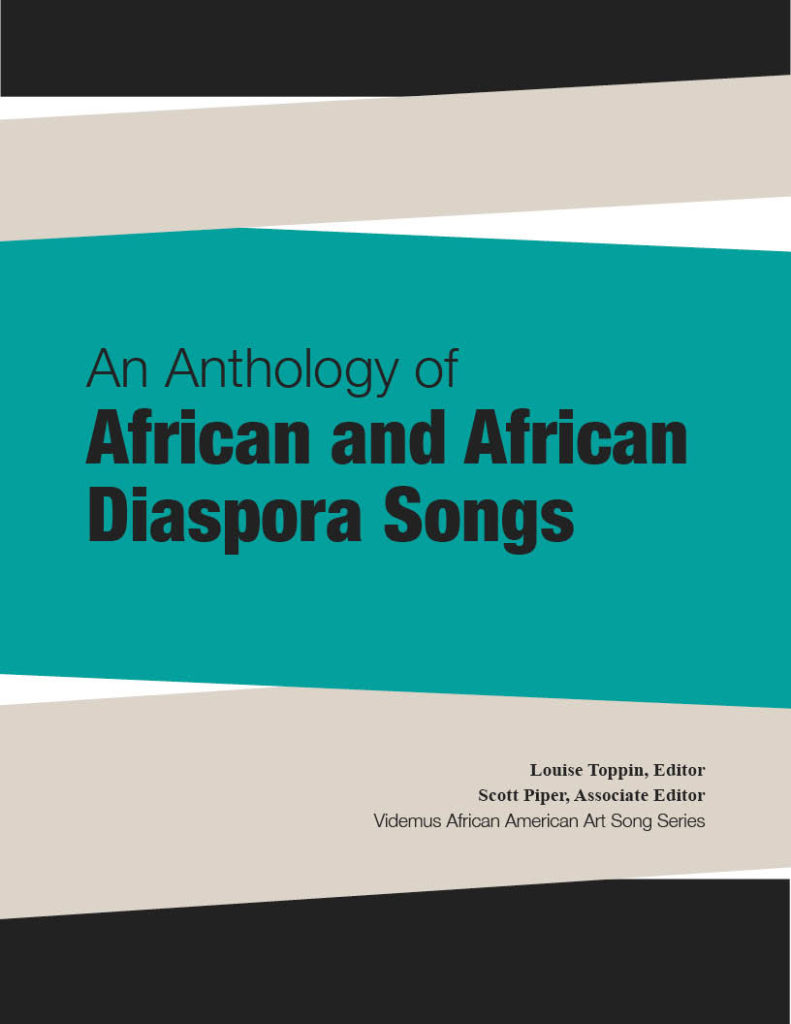Listen
Track:
Biography
Maud Cuney Hare was born in Galveston, Texas in 1874 to Adeline Dowdy Cuney and Norris Wright Cuney. Norris was a prominent business man and leader in state and national politics, and on top of that both him and her mother Adeline were skilled musicians. Her parents brought her and her brother up with a strong pride in their racial identity and emphasized the importance of both the arts and activism.
After growing up in Texas she moved to Boston to peruse music at the New England Conservatory and later English Literature at Harvard University’s Lowell Institute. During her time at the New England Conservatory for Music she encounter intense racial prejudice from her fellow students, to the point where the university suggested she move off campus for her own comfort and safety. She refused to allow herself to be bullied off of campus and remained there despite the hate she received.
After finishing her education she went back to Texas and taught at the Texas Deaf, Dumb, and Blind Institute for Colored Youths. She also taught music at State Normal and Industrial College in Texas. She then moved back to Boston to pursue her career as a pianist and lecturer. There she also helped to establish the Musical Art Studio in Boston, which helped to enliven the arts within the black community.
On top of her performing and research she was also a prominent writer of both nonfiction and theatrical works. She compiled a poetry book entitled The Message of the Trees in 1918, and wrote a play entitled Antar of Araby in 1929. She is also well known for writing her fathers biography Norris Wright Cuney: A Tribune of the Black People in 1913, as well as the incredibly popular book Negro Musicians and Their Music.
Maud was a proud black woman and was a proponent for equal rights specifically within the arts. Due to her light skin color she was often able to pass as “Spanish-American” and while this led to an easier life for her, she did not appreciate this handout she had been given. She disliked this rejection of her Black identity and required that she was always referred to correctly.
Her activism also reached into her compositional and musicological work. She was one of the first musicologists to intensely study Creole Music and bring it into the public eye.
– Megan Maloney
Bibliography:
Cuney-Hare, Maud. Norris Wright Cuney: a Tribune of the Black People. G.K. Hall, 1995.
Maude Cuney Hare. africandiasporamusicproject.org/maudecuney_hare.
Roses, Lorraine Elena, and Ruth Elizabeth. Randolph. Harlem Renaissance and beyond: Literary Biographies of 100 Black Women Writers, 1900-1945. Harvard University Press, 1997.
Related Information
Songs
Aine, dé, trois, Caroline
Maud Cuney Hare
Song Collection: Six Creole Folk-Songs
Aurore Pradère
Maud Cuney Hare
Song Collection: Six Creole Folk-Songs
Belle Layotte
Maud Cuney Hare
Song Collection: Six Creole Folk-Songs
Dialogue d’Amour
Maud Cuney Hare
Song Collection: Six Creole Folk-Songs
Gardé Piti Mulet Là
Maud Cuney Hare
Song Collection: Six Creole Folk-Songs
Quand mo-té jeun’
Maud Cuney Hare
Song Collection: Six Creole Folk-Songs
Six Creole Folk-Songs
Song CollectionMaud Cuney Hare
Recordings

"Singing Justice" Seminar Recital
(Margaret Bonds, Henry T. Burleigh, Maud Cuney Hare, Adolphus C. Hailstork, Lori Hicks, Hall Johnson, John Rosamond Johnson, Undine Smith Moore, Robert L. Morris, Robert Owens, Rosephanye Powell, Florence Price, Brandon J Spencer and Spiritual)
2022
View recording

An Anthology of African and African Diaspora Songs
(H. Leslie Adams, David N. Baker, Margaret Bonds, Charles Samuel Brown, Henry T. Burleigh, Valerie Capers, Harriette Davison Watkins, Adolphus C. Hailstork, Jonathan Bailey Holland, Undine Smith Moore, Camille Nickerson, Robert Owens, Zenobia Powell Perry, Florence Price, Rosephanye Powell, Dave Ragland, Hale Smith, Irene Britton Smith and Brandon J Spencer)
2021
View recording
Sheet Music
An Anthology of African and African Diaspora Songs - 60 Songs
Composer(s): H. Leslie Adams, David N. Baker, Margaret Bonds, Charles Brown, H. T. Burleigh, Valerie Capers, Samuel Coleridge-Taylor, Arthur Cunningham, Harriette Davison Watkins, William Dawson, Mark Fax, Bruce Forsythe, Antônio Carlos Gomes, Adolphus Hailstork, Jacqueline Hairston, Maud Cuney Hare, Jeraldine Herbison, Jonathan Holland, Sylvia Hollifield, Langston Hughes, J. Rosamond Johnson, Thomas Kerr, Lena McLin, Undine Smith Moore, Andre Myers, Camille Nickerson, Fred Onovwerosuoke, Eurydice Osterman, Robert Owens, Coleridge-Taylor Perkinson, Zenobia Powell Perry, Rosephanye Powell, Florence Price, Dave Ragland, Nadine Shanti, Carlos Simon, Hale Smith, Irene Britton Smith, Brandon Spencer, Hilbert Stewart, Howard Swanson, George Walker, Aurelia Young
Song(s): Amazing Grace (H. Leslie Adams)
Christmas Lullaby (H. Leslie Adams)
Sence You Went Away (H. Leslie Adams)
The Heart of a Woman (H. Leslie Adams)
The Alarm Clock (David N. Baker)
The Negro Speaks of Rivers (Margaret Bonds)
Caring (Charles Brown)
Desire (Charles Brown)
Your Eyes So Deep (H. T. Burleigh)
Your Lips Are Wine (H. T. Burleigh)
Autumn (Valerie Capers)
Elëanore (Samuel Coleridge-Taylor)
The Willow Song (Samuel Coleridge-Taylor)
Minakesh (Arthur Cunningham)
Stars (Harriette Davison Watkins)
Out in the Fields (William Dawson)
The Refused (Mark Fax)
With Rue My Heart Is Laden (Bruce Forsythe)
Suspiro d’alma (Antônio Carlos Gomes)
If I Can Stop One Heart from Breaking (Adolphus Hailstork)
Longing (Adolphus Hailstork)
Loveliest of Trees (Adolphus Hailstork)
Dormi, Jesu (Jacqueline Hairston)
Gardé Piti Mulet Là (Maud Cuney Hare)
I’ll Not Forget (Jeraldine Herbison)
Little Elegy (Jonathan Holland)
In Time of Silver Rain (Sylvia Hollifield)
The Founding Fathers (Langston Hughes)
This is My Land (Langston Hughes)
L’il Gal (J. Rosamond Johnson)
Soliloquy (Thomas Kerr)
Amazing Grace (Lena McLin)
The Year’s at the Spring (Lena McLin)
I Am in Doubt (Undine Smith Moore)
I Want to Die While You Love Me (Undine Smith Moore)
For a Poet (Andre Myers)
Chere, Mo Lemmé Toi (Camille Nickerson)
Gué, Gué, Solingaie (Camille Nickerson)
Mshila (Fred Onovwerosuoke)
Entreaty (I Am the Rose of Sharon) (Eurydice Osterman)
Could I but Ride Indefinite (Robert Owens)
Die Nacht (Robert Owens)
From the Dark Tower (Robert Owens)
The Lynching (Robert Owens)
The Secret (Robert Owens)
Madrigal (Coleridge-Taylor Perkinson)
O Children of Men (Zenobia Powell Perry)
I Want to Die While You Love Me (Rosephanye Powell)
Spring (Florence Price)
The Sum (Florence Price)
Martin Luther King, Jr. (Dave Ragland)
Mangez, Boulez (Eat, Drink, Be Merry) (Nadine Shanti)
Prayer (Carlos Simon)
Troubled Woman (Hale Smith)
Why Fades a Dream? (Irene Britton Smith)
Dream Variations (Brandon Spencer)
Spring Song (Hilbert Stewart)
One Day (Howard Swanson)
I Went to Heaven (George Walker)
Norris Swamp (Aurelia Young)
Voice Type: 36 Songs are for High Voice - Medium to High Voice
24 Songs are for Medium - Medium to Low Voice
Maud Cuney Hare: Six Creole Folk-Songs
Composer(s): Maud Cuney Hare
Song(s): “Aurore Pradère”, “Gardé Piti Mulet Là”, “Belle Layotte”, “Quand mo-té jeun’”, “Aine, dé, trois, Caroline”, Dialogue d’Amour,
Free via IMSLP
